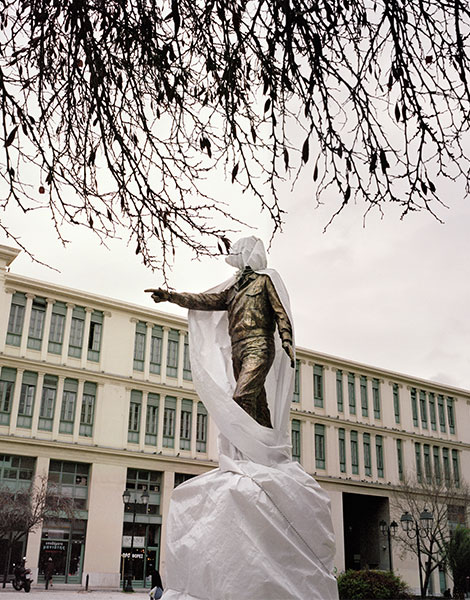A familiar portrait of Che Guevara hangs next to a starfish-shaped clock and a map of Greece on a Development Ministry wall, while an aquarium sets the tone in a waiting area at the National Crime Service’s Fraud Department.
While a sense of time suspended is a recurring feeling in the Greek capital’s public spaces, the city is acting as a “physical stage” for the ongoing crisis, says photographer Eirini Vourloumis, whose images of government building interiors highlight the sense of aesthetic surrealism long embedded in the local collective psyche.
Originally published as part of The New Yorker’s Photo Booth series in 2014, “In Waiting” is now a full body of work published in English by Hatje Cantz.

© Eirini Vourloumis
“The public service is really the skeleton or backbone by which a country is supported. A study of this seemed to me to be a good way to reveal different facets within a sociopolitical context but also to explore a part of the seed from which the economic crisis grew,” said Vourloumis in an interview. “But most importantly, these places may change in time or completely homogenize if they are privatized and there is a specific charm which will be lost.”
Devoid of human presence (an undertaker’s arm and a taxman’s shiny black pointed boots are the sole human cameos), “In Waiting” is about a country, as much as its people. Vourloumis highlights the continuing omnipresence of religion, for instance, with an icon hanging in a courtroom, and underlines a never-ending love affair with glorious antiquity, as copies of celebrated ancient statues stand at City Hall’s Birth Registry Office.
“When I took the photograph I did not take it only because it was broken but I liked the way it sat between the dark blue looming clouds, a quietly ominous setting. And now that I look back on it and as it’s the ending of the book, I see it more as a wink than anything else.”

© Eirini Vourloumis
To what extent can a country’s public interiors define the country’s aesthetics as a whole? “These places reveal different layers of our social and cultural conscience,” noted Vourloumis. “At first, one might focus on the disarray and lack of sophistication, but then nuances are revealed which expose an essence of our character and individuality as a country. Especially in the way that the offices are decorated. It’s important that employees have the freedom to decorate the walls as they please – regardless of who is governing. We Greeks like to do things our way and to not really care about etiquette, which is liberating in a way.”

© Eirini Vourloumis

© Eirini Vourloumis
Born to a Greek father and an Indonesian mother, Vourloumis was raised in Athens before graduating from Parsons School of Design and the Columbia Graduate School of Journalism in New York. Her work has been published in The New York Times and Le Monde, among other publications.
The idea for the photo project arose when she started visiting various Athens venues on assignment for foreign newspapers. She realized, she says, that there was a bigger story.
“The city is an aspiring Western European metropolis, but some of these interiors nonetheless reveal an almost antiquated and bare aesthetic quality, at odds with the modernity Greece yearns for,” she comments in the book.

© Eirini Vourloumis
“In Waiting” explores multiple layers of absurdity and odd beauty: graffiti on seats at the Athens University of Economics and Business and ancient ideals at Panteion University’s Ceremony Hall. The aim, argues Vourloumis, was “not to focus on the negative aspects, but find a manner to translate the prism of the economic crisis in a different way and to celebrate our authenticity and also to make people laugh, not at these spaces but with them. We are all part of the puzzle as citizens anyway.”
An on-and-off project carried out over a five-year period, “In Waiting” was at times subject to long periods of waiting for permission to access venues, one of the reasons being constant staff changes due to repeated elections and changes in power.
How much has changed since the beginning of the project? “A lot and a whole lot of nothing has changed. I think on the surface things may look more promising economically but in reality most people are still suffering and are living life in the suffocating grip of austerity measures. I feel that people are politically and psychologically exhausted and are dealing with the increasing pressure of daily life, hence the lack of public protest. We are becoming numb to all this in a way and somewhat paralyzed. Maybe most people have just been pushed to live in survival mode.”
“The aim was not to focus on the negative aspects, but find a manner to translate the prism of the economic crisis in a different way and to celebrate our authenticity and also to make people laugh, not at these spaces but with them. We are all part of the puzzle as citizens anyway.”

© Eirini Vourloumis
“In Waiting” can currently be purchased at Amazon UK and through Hatje Cantz’s online shop and will soon be available at local book shops, including the Benaki Museum and the National Bank of Greece Cultural Foundation.
Meanwhile, a broken street lamp features in one of the book’s final images. Vourloumis is not aware of whether or not it has been fixed since the photo was taken. “When I took the photograph I did not take it only because it was broken but I liked the way it sat between the dark blue looming clouds, a quietly ominous setting. And now that I look back on it and as it’s the ending of the book, I see it more as a wink than anything else. A self-embracing wink, a gesture from the city to itself.”












